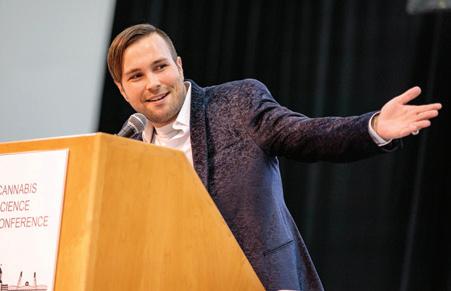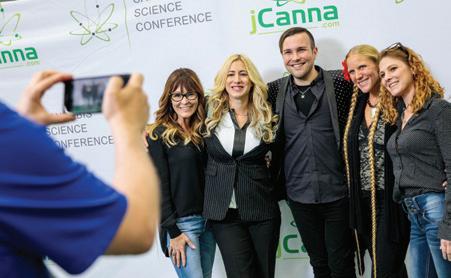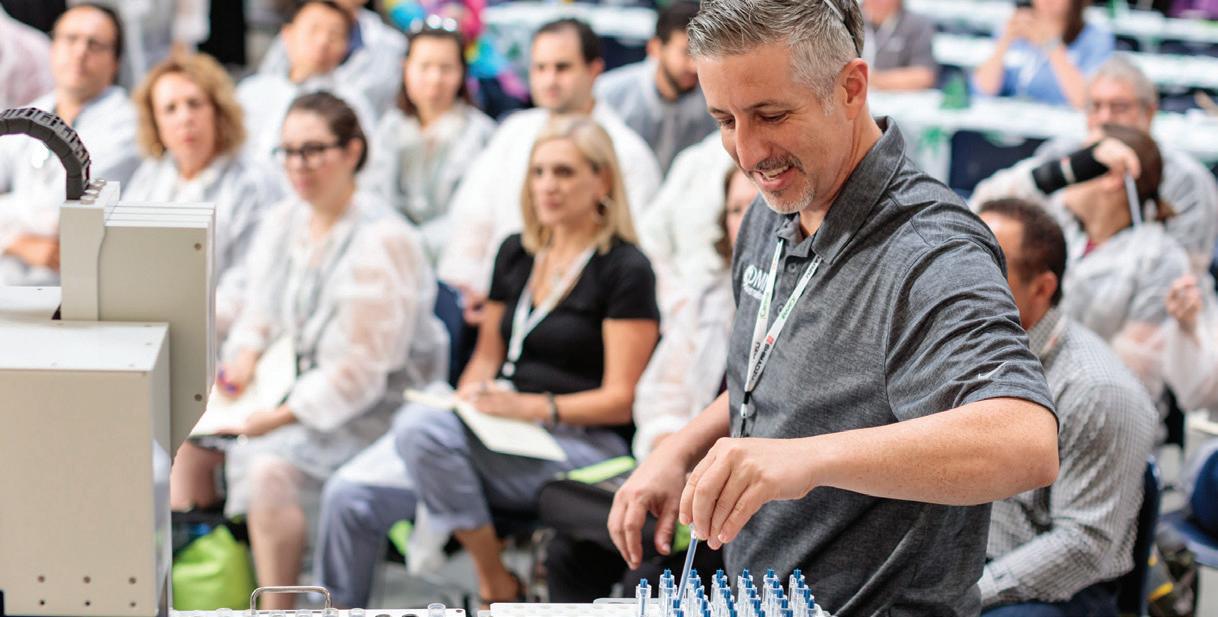
7 minute read
JOSH CROSSNEY: QUALITY + EDUCATION + CANNABIS
BY DR. DAWN HAYFORD
GRAM spoke with Josh Crossney, the founder of Cannabis Science Conference, one of the leading cannabis conferences in the U.S. brings together medical, analytical science, and cultivation experts. More on that in a minute. A career in staffing and recruiting for some of the biggest biological labs across the U.S. gave Josh an in-depth understanding of the importance of quality control and testing. That is what drove him into the medical cannabis industry in 2014. “It really was kind of alarming to me that at the time there were no requirements or quality control testing for cannabis.” “I connected with some people who were using cannabis as medicine out in California and a couple people who were treating children with cannabis,” he says. “Everything, just about, that comes in contact with humans—from food to beauty products to even water and wastewater—has quality control standards or testing,” he says. A passion for changing that was one of the things that drew Josh into the industry. Educating people about medical cannabis was another. “I realized there wasn’t a lot—really any—platforms at the time, that were really catering and creating a space for the world’s leading researchers and medical professionals and cultivation experts to come together and share their information with other like-minded people,” he says. In October 2016, Josh launched the first Cannabis Science Convention in Portland, Oregon. That first show drew about 800 attendees and 75 vendors. By 2019 the event was pulling in close to 3,500 people and almost 200 vendors. Last year, he launched the inaugural Cannabis Science Convention East at the Baltimore Convention Center in Maryland. “It really was a full circle moment for me when we were able to say ‘Hey, it’s been a few years. The East Coast has really developed when you look at states like Maryland, New Jersey, Pennsylvania, Delaware, and New York that have implemented medical cannabis programs since the time we launched the (Oregon) show.’” The move paid off, attracting over 2,000 attendees and about 110 vendors. Josh is a voice in the cannabis industry for the LGBTQ community, and he regularly speaks about the importance of diversity and inclusion. “More so than most industries that I’ve been a part of, the cannabis industry, and the folks and the colleagues I’ve worked with are very accepting and open to all types of people,” Josh says.


He states that the cannabis community and LGBTQ community might have more in common than you would think. “A lot of people don’t realize how many intersections there are between the LGBTQ community and the struggle that we went through in the U.S. and globally, also with the cannabis community. These are both two communities that have been unfairly marginalized and stigmatized by society.” Josh said that both are human rights issues that have gained traction on a state-by-state basis. He also pointed out that when California implemented medical cannabis in 1996, it was “largely due to the advocacy, leaders, and pioneers who were pushing for this as an option for the HIV and AIDS communities.” “There are a lot of crossovers that people don’t realize. Cannabis has been used and accepted as a medicine in society for far, far longer than it has been stigmatized as one.” A serious car accident in the winter of 2009 triggered Josh’s firsthand experience using cannabis as medicine. Returning home during a snowstorm from a sleigh-riding excursion, the car he was riding in crashed into the back of a state snowplow. More than a decade later, he still suffers from back and shoulder pain as a result. “I use cannabis as an alternative to the opiates that everyone gets prescribed when you have injuries like that,” he said. It also helps him with PTSD from the accident. “As a passenger, it was very intense. For me, it can be challenging to be a passenger in cars at times. Cannabis really does help me deal with that.” Josh also finds relief for his anxiety. “There’s not a lot of pharmaceutical options other than benzos, which really are just as bad as opiates; they really turn you into a shell of yourself. So I just found that cannabis, for me, was a much better, safer alternative that actually worked a lot better than prescription drugs.” Knowing firsthand the benefits, Josh has big goals “to educate the masses and let people know this is an option.” He has his own Maryland-based 501(c)3 non-profit called jCanna—focused on advancing cannabis science and specifically cannabis quality control testing and extraction processes and standards.“Everything that I do, everything that I touch in this industry really is, at the core, trying to drive more normalization of this plant, acceptance of this plant.” “We’re having to dig out of 50 plus years of misinformation and propaganda. It’s not a new conversation. Prohibition and reefer madness was really something that was based on racism and greed and the need and want to monopolize the American industry, like pharmaceutical and paper. A lot of people don’t realize the first draft of the Constitution was drawn up on hemp paper.” However, Josh doesn’t see cannabis advocacy as a blanket label and acknowledges people disagree. “I’m definitely all for adult use and recreational use, and this being legalized and normalized federally,” he said. “But I also am a major proponent of medical, and I would hate to see the government say, ‘Well, we’re gonna go ahead and legalize this for recreational use, but we’re not gonna call this a medicine.’ “If that was the case and this was regulated like alcohol, how would the 10-month-old babies, the 2-year-old children, the people who are using this as a medicine, how would they have access to this if it was regulated like alcohol, and it was a 21-orover situation without any option for them? Yes, legalizing and normalizing this plant federally but also maintaining the medical term, and that this is a medicine.”

As a board member of the California based CannaKids, Josh cares deeply about pediatric cannabis use. “If this is legal in your state for an adult to use a medical condition, I think that it should not be any more stigmatized for a pediatric patient going through the same condition to have this as an option.” This brings him back to the importance of quality control and testing in the cannabis industry. “If you’re treating a sick pediatric cancer patient who’s going through chemo and radiation with a highly compromised immune system, contaminated cannabis with mold, heavy metals, or solvents can really negatively affect their health.” It’s not just about contamination, but knowing exactly what is in the medicine and how strong it is. “That is important when you are talking about trying to target and treat conditions. We just want this natural plant to be as natural as possible” he says. In fact, Josh has a quality control dream. “I would love to see this standardized and have quality control required and standardized all over the country and get it to a point where you can send a

cannabis sample to five different labs and get the same result. The problem right now is if you sent a cannabis sample to five different labs, there’s not standardization. They’re using different types of instrumentation, different processes. Any of these factors can change the results of your certificate of quality.” Josh is constantly busy travelling, speaking, and expanding the Cannabis Science Convention. “We’re continuing to grow the shows. We’re on the East Coast and the West Coast. We have been dabbling with the idea of a Midwest show at some point. We’re also really strongly looking at international markets. We’d love to, potentially, do a show in Germany where cannabis is just starting to develop.” “This year, one of the new things is in addition to our analytical science, medical cannabis, and cultivations tracks, we’ve also launched a whole 2-day hemp/CBD track.” Adding the hemp/CBD track is just one way Josh is continuing to educate medical professionals and patients. He is also involving the academic community by shining a light on their contributions to the cannabis science through developments in the curriculum at Johns Hopkins, Rutgers, and Northern Michigan University, and the University of Maryland School of Pharmacy. “We really feel that knowledge is power and empowered patients can make the best decisions about their cannabis care.”










